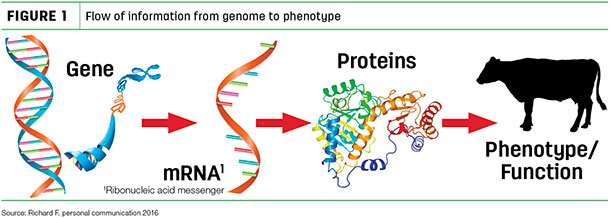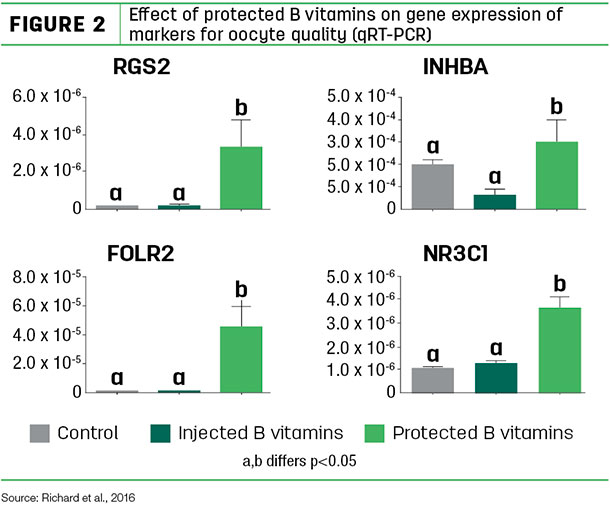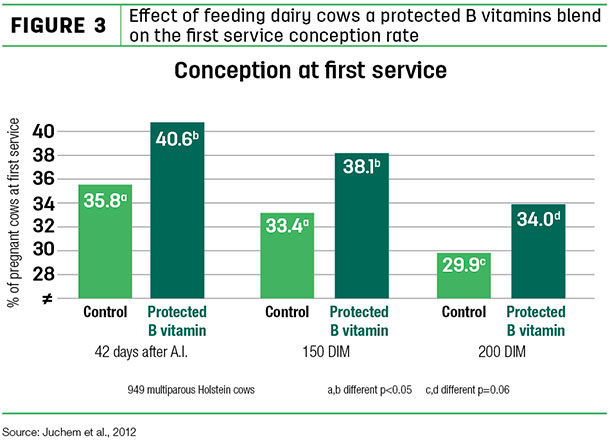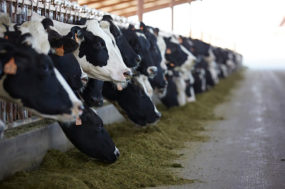Increasing pregnancy rate from 15 percent to 20 percent has been shown to represent a savings between US$150 to US$200 per cow per year.
Management factors, like cow comfort, heat detection, etc., are involved in reproductive performance and many articles have been written on these subjects. Various nutritional solutions are available for the dairy producer and have been proven to be effective.
Conducting studies to evaluate the response of a nutritional solution on reproductive performance is challenging due to the long list of factors that can influence it.
This creates a very high variability in the response between animals and requires a very large number of dairy cows to be included in the reproduction study in order to show a significant difference between the tested groups.
Nutrigenomics is an innovative tool to evaluate the effect of a nutritional solution on reproductive performance with very specific outcomes, and it allows researchers to use a smaller number of animals to determine effectiveness.
What is nutrigenomics and its benefits?
Nutrigenomics is the influence of nutrients on the expression of specific genes. The word nutrigenomics does not imply the effect of nutrients on the genes itself; rather, it involves the interactions between the nutrient and the genes through the action of specific regulatory factors.
Nutrients are now considered as “signaling molecules” which can control how genes are expressed.
Nutrigenomics helps to determine the influence of different dietary regimens at the molecular level (i.e., what happens in cells and organs when animals eat specific nutrients) on the response of biological systems to the overall outcome such as differences in milk production, feed efficiency, reproduction or disease resistance.
An example of this flow of information could be a dietary treatment modifying the specific gene expression of liver cells. The change in the expression of specific genes or markers involved in glucose synthesis would influence the production of a protein (example: enzyme).
The outcome of this change would be an increased glucose production resulting in higher milk production (Figure 1).

This tool allows researchers to evaluate how the biology of a specific organ will be influenced by the nutritional treatment.
Recent nutrigenomic studies using specific cells of the reproductive tract and the ovarian follicles identified how a nutritional treatment positively influenced the reproduction of dairy cows.
Nutrigenomic studies to evaluate the effect of protected B vitamins on reproduction
Two recent studies using nutrigenomics were conducted with dairy cows to understand the mode of action of rumen-protected B vitamins on their reproductive performance.
Dairy cows were fed a blend of protected B vitamins (folic acid, B12, riboflavin and choline) pre- and post-calving, followed by the supplementation of another blend of protected B vitamins (folic acid, B12, pyridoxine, pantothenic acid and biotin) during the early lactation period.
The objective of the first study was to evaluate the effect of the dietary protected B vitamins blend on the gene expression of the granulosa cells of the dominant ovarian follicle.
Those cells were selected because they transfer nutrients and signals to the oocyte and are crucial for its development and quality. The experiment was conducted with 30 cows and three treatment groups.
One group did not receive any supplementation of B vitamins, the second group was injected weekly with folic acid and B12 and the third group was fed the two different blends of protected B vitamins as described above.
The treatment period started 21 days before calving until the pickup of the ovary at 57 days in milk (DIM).
The researchers determined that genes involved in the release of hormones and oocyte quality were expressed in a larger extent when dairy cows were supplemented with protected B vitamins compared to no supplementation or when injected with folic acid and B12 (Figure 2).

This response indicates that the dominant follicle was preparing for earlier ovulation and furthermore, oocyte quality was improved.
The objective of the second study was to evaluate the effect of the same two dietary protected B vitamins blends on the gene expression of specific markers for embryo survival from the endometrium cells.
Fifty-one cows were enrolled in the study and separated in a control group which did not receive any supplementation of B vitamins and a treatment group fed the protected B vitamins. The feeding period started 21 days prior to calving until 15 days after insemination.
Specific gene markers for cell immunity and cell adhesion were expressing in a larger extent when dairy cows were supplemented with protected B vitamins compared to no supplementation.
The results clearly showed a potential for improved embryo attachment to the uterus and a better environment for the embryo’s development, which is supportive toward enhanced early embryo survival.
The results from the nutrigenomic studies helped to comprehend better why and how reproductive performance was improved in other trials when cows were supplemented with similar or identical blends of rumen-protected B vitamins.
To elaborate, in a large reproduction study conducted with 949 multiparous dairy cows from 22 days in milk until pregnant, a dietary supplementation of protected B vitamins (folic acid, pyridoxine, pantothenic acid, biotin and B12) improved first-service conception rate by 13 percent in the supplemented group, and the same percentage of improvement was maintained until 200 DIM (Figure 3).

The authors hypothesized that the B vitamins supplementation response may have been due to an improved oocyte quality and early embryo survival.
This is now supported by the recent nutrigenomic studies showing an improved oocyte quality and embryo survival when dairy cows were supplemented with the same blend of protected B vitamins during the early lactation period.
Nutrigenomics is a scientific tool to better evaluate future feeding strategies for optimum performance in dairy cattle.
Its use in reproduction along with controlled field studies with the dietary supplementation of protected B vitamins blends during the transition and lactation period confirm the benefit of this innovative nutritional solution to improve reproductive performance, which will increase farm profitability. ![]()
References omitted but are available upon request. Click here to email an editor.

-
Hélène Leclerc
- Technical Support and R&D
- Jefo Nutrition Inc.
- Email Hélène Leclerc









